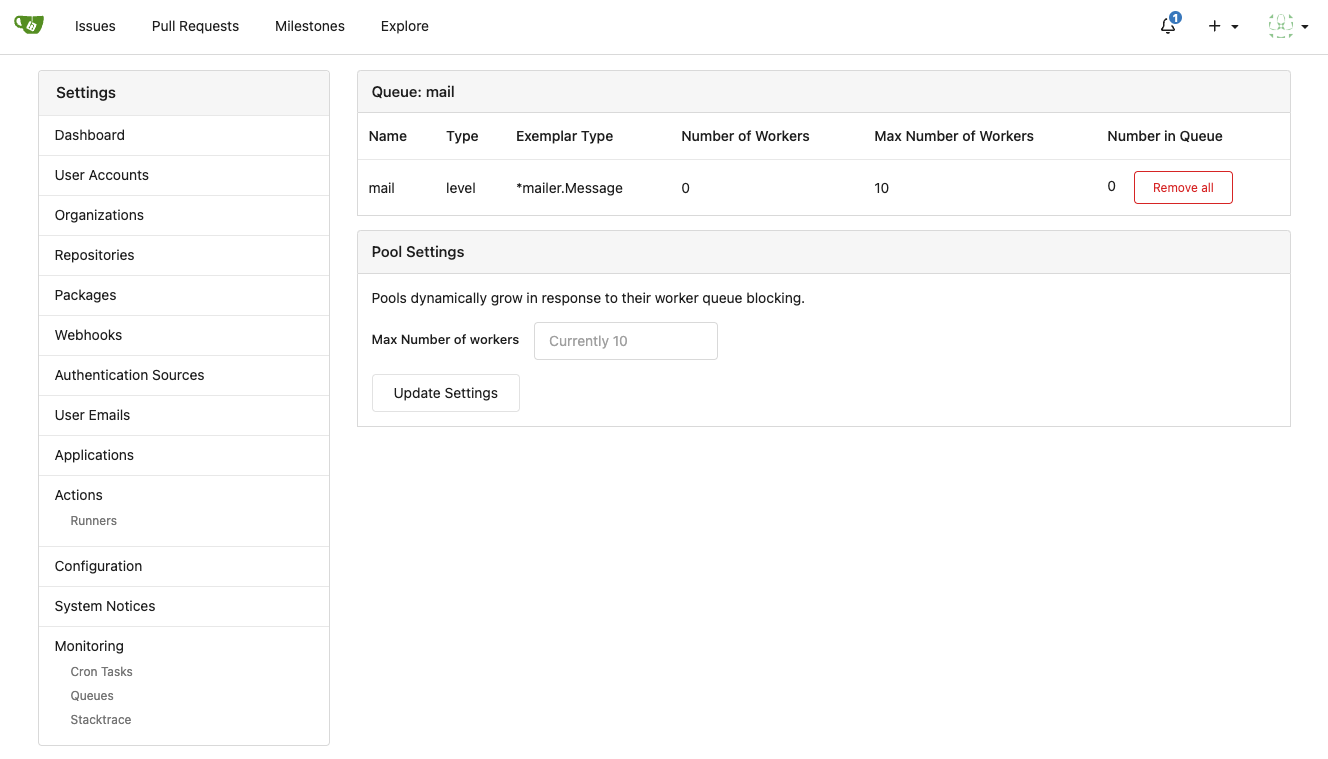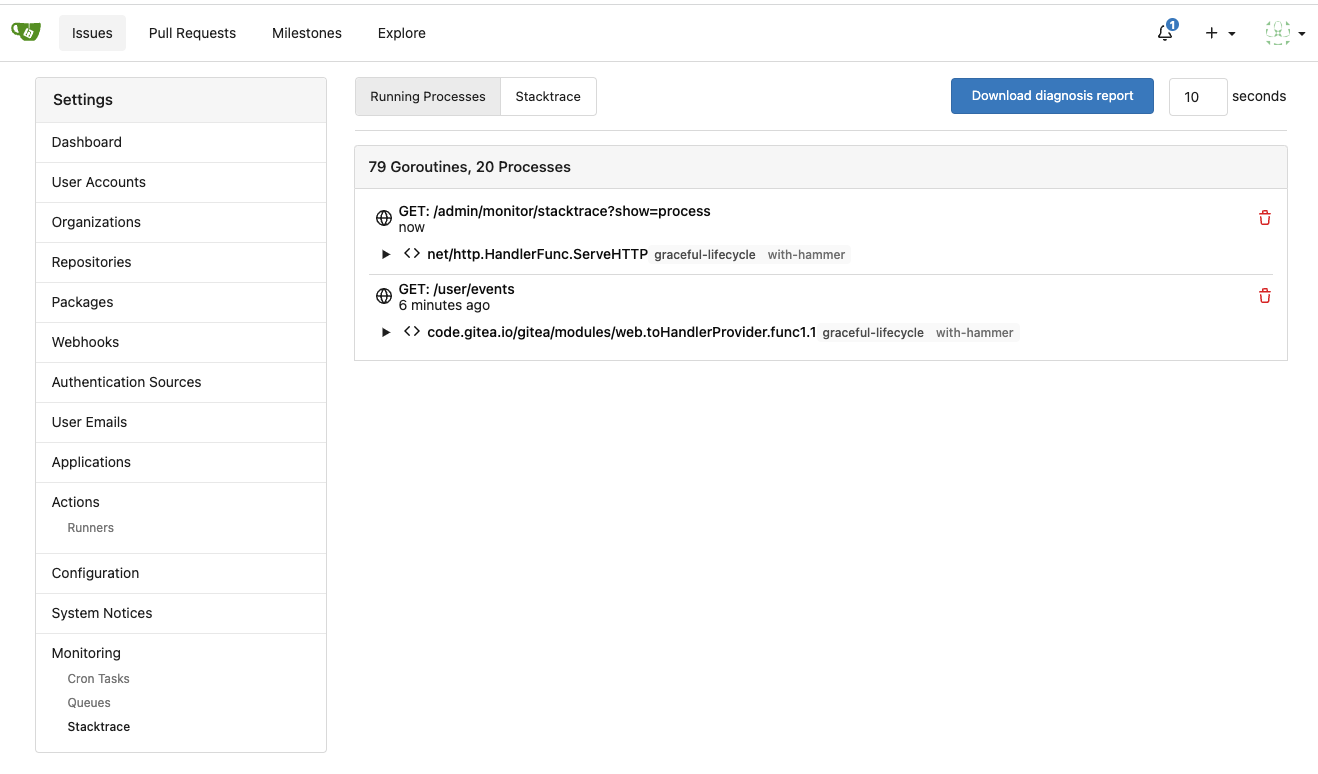mirror of
https://codeberg.org/forgejo/forgejo.git
synced 2024-12-23 07:43:18 -05:00
Although some features are mixed together in this PR, this PR is not
that large, and these features are all related.
Actually there are more than 70 lines are for a toy "test queue", so
this PR is quite simple.
Major features:
1. Allow site admin to clear a queue (remove all items in a queue)
* Because there is no transaction, the "unique queue" could be corrupted
in rare cases, that's unfixable.
* eg: the item is in the "set" but not in the "list", so the item would
never be able to be pushed into the queue.
* Now site admin could simply clear the queue, then everything becomes
correct, the lost items could be re-pushed into queue by future
operations.
3. Split the "admin/monitor" to separate pages
4. Allow to download diagnosis report
* In history, there were many users reporting that Gitea queue gets
stuck, or Gitea's CPU is 100%
* With diagnosis report, maintainers could know what happens clearly
The diagnosis report sample:
[gitea-diagnosis-20230510-192913.zip](https://github.com/go-gitea/gitea/files/11441346/gitea-diagnosis-20230510-192913.zip)
, use "go tool pprof profile.dat" to view the report.
Screenshots:



---------
Co-authored-by: Jason Song <i@wolfogre.com>
Co-authored-by: Giteabot <teabot@gitea.io>
246 lines
6.7 KiB
Go
246 lines
6.7 KiB
Go
// Copyright 2023 The Gitea Authors. All rights reserved.
|
|
// SPDX-License-Identifier: MIT
|
|
|
|
package queue
|
|
|
|
import (
|
|
"context"
|
|
"fmt"
|
|
"sync"
|
|
"sync/atomic"
|
|
"time"
|
|
|
|
"code.gitea.io/gitea/modules/graceful"
|
|
"code.gitea.io/gitea/modules/json"
|
|
"code.gitea.io/gitea/modules/log"
|
|
"code.gitea.io/gitea/modules/setting"
|
|
)
|
|
|
|
// WorkerPoolQueue is a queue that uses a pool of workers to process items
|
|
// It can use different underlying (base) queue types
|
|
type WorkerPoolQueue[T any] struct {
|
|
ctxRun context.Context
|
|
ctxRunCancel context.CancelFunc
|
|
ctxShutdown atomic.Pointer[context.Context]
|
|
shutdownDone chan struct{}
|
|
|
|
origHandler HandlerFuncT[T]
|
|
safeHandler HandlerFuncT[T]
|
|
|
|
baseQueueType string
|
|
baseConfig *BaseConfig
|
|
baseQueue baseQueue
|
|
|
|
batchChan chan []T
|
|
flushChan chan flushType
|
|
|
|
batchLength int
|
|
workerNum int
|
|
workerMaxNum int
|
|
workerActiveNum int
|
|
workerNumMu sync.Mutex
|
|
}
|
|
|
|
type flushType chan struct{}
|
|
|
|
var _ ManagedWorkerPoolQueue = (*WorkerPoolQueue[any])(nil)
|
|
|
|
func (q *WorkerPoolQueue[T]) GetName() string {
|
|
return q.baseConfig.ManagedName
|
|
}
|
|
|
|
func (q *WorkerPoolQueue[T]) GetType() string {
|
|
return q.baseQueueType
|
|
}
|
|
|
|
func (q *WorkerPoolQueue[T]) GetItemTypeName() string {
|
|
var t T
|
|
return fmt.Sprintf("%T", t)
|
|
}
|
|
|
|
func (q *WorkerPoolQueue[T]) GetWorkerNumber() int {
|
|
q.workerNumMu.Lock()
|
|
defer q.workerNumMu.Unlock()
|
|
return q.workerNum
|
|
}
|
|
|
|
func (q *WorkerPoolQueue[T]) GetWorkerActiveNumber() int {
|
|
q.workerNumMu.Lock()
|
|
defer q.workerNumMu.Unlock()
|
|
return q.workerActiveNum
|
|
}
|
|
|
|
func (q *WorkerPoolQueue[T]) GetWorkerMaxNumber() int {
|
|
q.workerNumMu.Lock()
|
|
defer q.workerNumMu.Unlock()
|
|
return q.workerMaxNum
|
|
}
|
|
|
|
func (q *WorkerPoolQueue[T]) SetWorkerMaxNumber(num int) {
|
|
q.workerNumMu.Lock()
|
|
defer q.workerNumMu.Unlock()
|
|
q.workerMaxNum = num
|
|
}
|
|
|
|
func (q *WorkerPoolQueue[T]) GetQueueItemNumber() int {
|
|
cnt, err := q.baseQueue.Len(q.ctxRun)
|
|
if err != nil {
|
|
log.Error("Failed to get number of items in queue %q: %v", q.GetName(), err)
|
|
}
|
|
return cnt
|
|
}
|
|
|
|
func (q *WorkerPoolQueue[T]) FlushWithContext(ctx context.Context, timeout time.Duration) (err error) {
|
|
if q.isBaseQueueDummy() {
|
|
return
|
|
}
|
|
|
|
log.Debug("Try to flush queue %q with timeout %v", q.GetName(), timeout)
|
|
defer log.Debug("Finish flushing queue %q, err: %v", q.GetName(), err)
|
|
|
|
var after <-chan time.Time
|
|
after = infiniteTimerC
|
|
if timeout > 0 {
|
|
after = time.After(timeout)
|
|
}
|
|
c := make(flushType)
|
|
|
|
// send flush request
|
|
// if it blocks, it means that there is a flush in progress or the queue hasn't been started yet
|
|
select {
|
|
case q.flushChan <- c:
|
|
case <-ctx.Done():
|
|
return ctx.Err()
|
|
case <-q.ctxRun.Done():
|
|
return q.ctxRun.Err()
|
|
case <-after:
|
|
return context.DeadlineExceeded
|
|
}
|
|
|
|
// wait for flush to finish
|
|
select {
|
|
case <-c:
|
|
return nil
|
|
case <-ctx.Done():
|
|
return ctx.Err()
|
|
case <-q.ctxRun.Done():
|
|
return q.ctxRun.Err()
|
|
case <-after:
|
|
return context.DeadlineExceeded
|
|
}
|
|
}
|
|
|
|
// RemoveAllItems removes all items in the baes queue
|
|
func (q *WorkerPoolQueue[T]) RemoveAllItems(ctx context.Context) error {
|
|
return q.baseQueue.RemoveAll(ctx)
|
|
}
|
|
|
|
func (q *WorkerPoolQueue[T]) marshal(data T) []byte {
|
|
bs, err := json.Marshal(data)
|
|
if err != nil {
|
|
log.Error("Failed to marshal item for queue %q: %v", q.GetName(), err)
|
|
return nil
|
|
}
|
|
return bs
|
|
}
|
|
|
|
func (q *WorkerPoolQueue[T]) unmarshal(data []byte) (t T, ok bool) {
|
|
if err := json.Unmarshal(data, &t); err != nil {
|
|
log.Error("Failed to unmarshal item from queue %q: %v", q.GetName(), err)
|
|
return t, false
|
|
}
|
|
return t, true
|
|
}
|
|
|
|
func (q *WorkerPoolQueue[T]) isBaseQueueDummy() bool {
|
|
_, isDummy := q.baseQueue.(*baseDummy)
|
|
return isDummy
|
|
}
|
|
|
|
// Push adds an item to the queue, it may block for a while and then returns an error if the queue is full
|
|
func (q *WorkerPoolQueue[T]) Push(data T) error {
|
|
if q.isBaseQueueDummy() && q.safeHandler != nil {
|
|
// FIXME: the "immediate" queue is only for testing, but it really causes problems because its behavior is different from a real queue.
|
|
// Even if tests pass, it doesn't mean that there is no bug in code.
|
|
if data, ok := q.unmarshal(q.marshal(data)); ok {
|
|
q.safeHandler(data)
|
|
}
|
|
}
|
|
return q.baseQueue.PushItem(q.ctxRun, q.marshal(data))
|
|
}
|
|
|
|
// Has only works for unique queues. Keep in mind that this check may not be reliable (due to lacking of proper transaction support)
|
|
// There could be a small chance that duplicate items appear in the queue
|
|
func (q *WorkerPoolQueue[T]) Has(data T) (bool, error) {
|
|
return q.baseQueue.HasItem(q.ctxRun, q.marshal(data))
|
|
}
|
|
|
|
func (q *WorkerPoolQueue[T]) Run(atShutdown, atTerminate func(func())) {
|
|
atShutdown(func() {
|
|
// in case some queue handlers are slow or have hanging bugs, at most wait for a short time
|
|
q.ShutdownWait(1 * time.Second)
|
|
})
|
|
q.doRun()
|
|
}
|
|
|
|
// ShutdownWait shuts down the queue, waits for all workers to finish their jobs, and pushes the unhandled items back to the base queue
|
|
// It waits for all workers (handlers) to finish their jobs, in case some buggy handlers would hang forever, a reasonable timeout is needed
|
|
func (q *WorkerPoolQueue[T]) ShutdownWait(timeout time.Duration) {
|
|
shutdownCtx, shutdownCtxCancel := context.WithTimeout(context.Background(), timeout)
|
|
defer shutdownCtxCancel()
|
|
if q.ctxShutdown.CompareAndSwap(nil, &shutdownCtx) {
|
|
q.ctxRunCancel()
|
|
}
|
|
<-q.shutdownDone
|
|
}
|
|
|
|
func getNewQueueFn(t string) (string, func(cfg *BaseConfig, unique bool) (baseQueue, error)) {
|
|
switch t {
|
|
case "dummy", "immediate":
|
|
return t, newBaseDummy
|
|
case "channel":
|
|
return t, newBaseChannelGeneric
|
|
case "redis":
|
|
return t, newBaseRedisGeneric
|
|
default: // level(leveldb,levelqueue,persistable-channel)
|
|
return "level", newBaseLevelQueueGeneric
|
|
}
|
|
}
|
|
|
|
func NewWorkerPoolQueueBySetting[T any](name string, queueSetting setting.QueueSettings, handler HandlerFuncT[T], unique bool) (*WorkerPoolQueue[T], error) {
|
|
if handler == nil {
|
|
log.Debug("Use dummy queue for %q because handler is nil and caller doesn't want to process the queue items", name)
|
|
queueSetting.Type = "dummy"
|
|
}
|
|
|
|
var w WorkerPoolQueue[T]
|
|
var err error
|
|
queueType, newQueueFn := getNewQueueFn(queueSetting.Type)
|
|
w.baseQueueType = queueType
|
|
w.baseConfig = toBaseConfig(name, queueSetting)
|
|
w.baseQueue, err = newQueueFn(w.baseConfig, unique)
|
|
if err != nil {
|
|
return nil, err
|
|
}
|
|
log.Trace("Created queue %q of type %q", name, queueType)
|
|
|
|
w.ctxRun, w.ctxRunCancel = context.WithCancel(graceful.GetManager().ShutdownContext())
|
|
w.batchChan = make(chan []T)
|
|
w.flushChan = make(chan flushType)
|
|
w.shutdownDone = make(chan struct{})
|
|
w.workerMaxNum = queueSetting.MaxWorkers
|
|
w.batchLength = queueSetting.BatchLength
|
|
|
|
w.origHandler = handler
|
|
w.safeHandler = func(t ...T) (unhandled []T) {
|
|
defer func() {
|
|
err := recover()
|
|
if err != nil {
|
|
log.Error("Recovered from panic in queue %q handler: %v\n%s", name, err, log.Stack(2))
|
|
}
|
|
}()
|
|
return w.origHandler(t...)
|
|
}
|
|
|
|
return &w, nil
|
|
}
|

